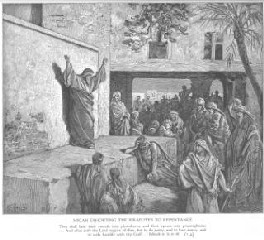
Well, I've been a fairly unfaithful blogger lately, I'm sorry to say! Let's start things up again with a short and painless entry. What follows is a pre-press reflection on Micah 6:6-8 that Fuller Theological Seminary asked me to write for their Southern California newsletter. Faithful Enormous Hippo readers like you will get it first.
"Doing Liturgy, Doing Love"
The prophetic injunction in Micah 6:6-8 is exactly the kind of warning one would expect a highly ordered (scripturally ordered, no less) worshipping community like Israel might need to hear fairly often. It is as if Micah said, “never let this good, divinely-inspired liturgy (burnt offerings, calves, rams, oil) replace love (doing “justice” and “mercy”). Christians should not over-read this text as if it were privileging acts of mercy over acts of worship, as if the two were somehow in essential contradiction. We can imagine some choice words that Micah might have had for an Aaronic priest who heard Micah 6:6-8 and then declared, “Yes, mercy is what matters, not worship! Until we achieve social justice in Israel, we’re calling off the morning and evening sacrifices, as well as Passover and Pentecost.” As long as God remains the loving Redeemer of his people, the corporate worship of the people is the obvious, proper, and instinctive response of the redeemed.
But the sin crouching at the door is to make the zealousness or regularity of our worship acts into bankable credits that can buy us out of the harder work of loving the unlovely and resisting unjust powers. It is always easier to sing a hymn than to “do advocacy” or the even harder work of, say, spending an hour caring for an emotionally needy person. The front page of the New York Times yesterday described the resurgence of liberation theology in Brazil , on the eve of Pope Benedict’s visit – the same man who, twenty-five years ago, helped write his church’s official denunciations of the movement. But in light of Micah’s words, even Protestant/Evangelical-me must admit (with the liberationists) that some engagement with causes of justice is part of my mandate as a follower of a justice loving God, and (with the Pope) that service without a heart that delights in the God who offers a greater “inner liberty” (Ratzinger’s phrase) in Christ is just a different kind of vanity and emptiness.
In the end, the best way to pursue “justice and mercy” without eclipsing the worship of the triune God is to look at the cross. Calvary keeps us from the easy moralism of much activism because it shows us that we ourselves would have been the just target of divine retribution apart from Jesus’ advocacy for us. And deeds of mercy are now calibrated as responses to a greater cross-shaped mercy we have received, not as abstract works of obedience or mere moral duty. On the other hand, the cross moves us to worship because it shows us the willing condescension of a God who was eager to give us mercy instead of justice , welcome instead of exile. Pouring out “ten thousand rivers of oil” for such a God would be, even still, too meager an act of worship.
